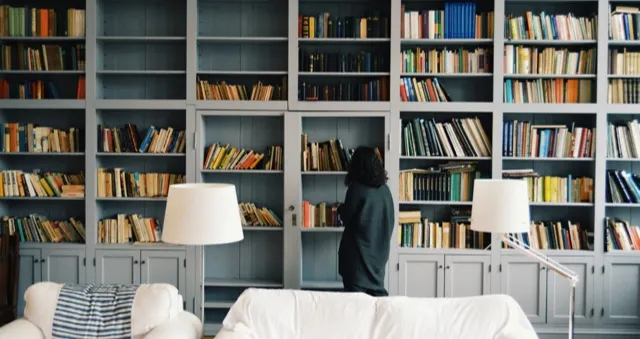
How to Build Built-in Bookshelves
Built-in bookshelves are my weakness. While I love uniquely refurbished bookcases, creative ways to house books, and cute shelves for small spaces, what I really dream about are custom built-in bookshelves that span the entire wall.
If you’re thinking it will be costly, you’re right. Interior designers and contractors will charge you a lot for custom bookshelves, and rightly so, because it takes design expertise and carpentry skills to build a flawless and professional wall of shelves.
However, if you’re pining away for a forever home for your books, it’s definitely possible to build your own on a budget with a little know-how. Kristin Cadwallader built these for less than $600, for example.
As long as you’re willing to learn some basic building skills, acquire some power tools, and give up some weekends to build your project, you are totally capable of adding a beautiful wall of shelves to your home that you can be proud of.
To start, ask yourself what type of built-in you want: an entire wall covered in shelves? A combination of shelves and cabinetry? If you’re dreaming of a project like the little unused triangle under the stairs, or a wall with multiple windows or doors, just be aware it will take more advanced skills and experience.
For beginners who are interested in how to build in built-in bookshelves, I suggest starting with the simplest project: a blank wall which you can cover from end to end with built-in bookshelves. Read on for a basic tutorial on how to do this.
How to Build Built-In Bookshelves: What You’ll Need
Materials
- Self-assemble bookcase of your choice; I like Ikea’s Billy Bookcases because they come in various sizes and offer an extension shelf to get your bookcase all the way up to the ceiling
- Filler board, such as plywood or MDF sheets
- Crown and base molding to match your existing molding
- Patching agent
- Wood Glue
- Primer: If you’re painting a factory finished surface, make sure you use a really strong primer
- Paint: Vaspar Dove White matches the Ikea Billy in white.
Recommended Tools
- Power Drill
- Nail Gun
- Circular or Table Saw (optional).
- Miter Saw (optional).
How to Build Built-In Bookshelves: Directions
- Find a plain wall that you want to transform into a wall of books. It could be a statement wall in your living room, a neglected wall in the hallway, or a home office wall.
- Measure the length, width, and height of the wall under consideration. It helps to make a little sketch.
- Using the catalog of available sizes in your line of self-assemble bookcases, see how many shelves it takes to fill up your wall. You could go with something totally uniform, or have some variety in sizes. For example:
- Pay special attention to how wide the gaps will be on the sides and top of your stacked bookshelves. A big part of achieving the “built-in” look involves covering these gaps with filler board. To maximize space, you’ll want as little unused space as possible behind your filler board. Try to fit as many shelves as you can, and go as high as you can with shelf extenders.
- Purchase and build your shelves. You can also paint them if, like me, you have other cabinetry to match your shelves with.
- Position and attach your shelving to your wall and to each other. Securing your shelves is an important safety step. The Billy Bookcases come with L-brackets so that in the event of an earthquake or, say, a rambunctious toddler who decides to climb the book tower, your wall of books does not come crashing down.
- The next step is the “built-in” part of the project, the thing that makes your shelves customized for your space. Measure the gaps above, between, and to the sides of the shelves.
- Cut your filler board into strips wide enough to hide the gaps on either side of your shelves. You will also need to fill the gap between the shelves and your ceiling. Home Depot will rip lengthwise and cut widthwise your pieces for free so long as you tell them your specifications. So you don’t necessarily need a table saw for this, but you do need very accurate measurements.
- Glue and attach your filler pieces. I use a nail gun for filler pieces because the nail holes are tiny and easy to patch. But if you don’t own a nail gun, you can drill a hole and screw your filler pieces in. You can also use a hammer and finish nails.
- Once your filler pieces are in, glue and attach your crown and base molding to them using a nail gun. If you’re going totally modern with clean lines, you might choose to leave off the crown molding. If your room already has crown and base molding, make sure to get matching molding for the built-in bookshelf.
- The last step is to patch, prime, and paint your filler and molding to match the finish of your shelves. When the detail work is done, you’ll have not only a custom built-in bookcase, but some newly acquired building skills as well! Then maybe you can dream about custom shelving under the stairs…








